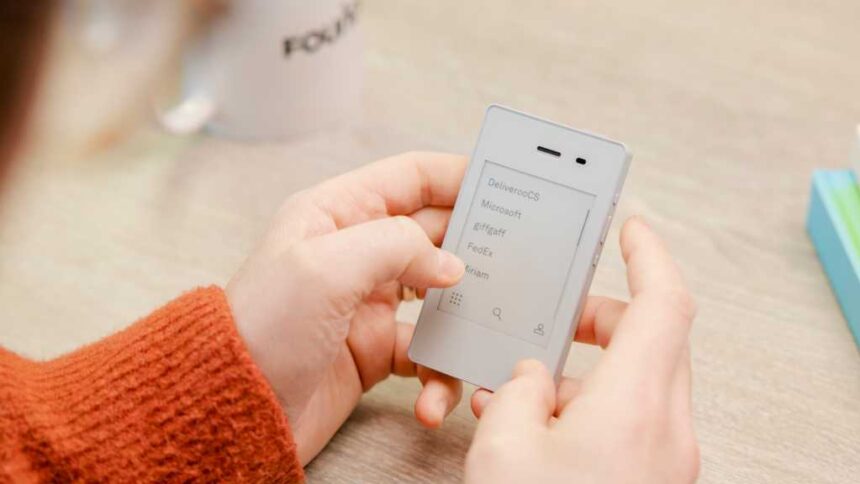Nowadays, when almost everyone seems glued to their phones, the idea of using a ‘dumb phone’ has become pretty appealing to many people.
Whether you want to cut back on distractions, reduce your screen time, or just simplify your life, switching to one of the best basic phones can be a great option.
But before you make the jump, here are seven important questions you should ask yourself.
1. Why do I want a dumb phone?
Before you decide, think about why you want to make the switch. Understanding why you’re considering a dumb phone will guide you in making the right choice.
Ask yourself if it’s because of the constant digital overload or if your phone usage has become detrimental to your productivity or well-being. You might also feel overwhelmed by social media platforms or constant notifications that fragment your attention.
Knowing your reasons will help you to understand if a dumb phone can really help you achieve what you’re looking for.
2. How will it affect my day-to-day life?
Phones have become part of so many things we do every day, from waking up with alarms, finding the quickest route using maps, to buying things online or paying with your phone at the store.
Transitioning to a dumb phone can initially feel like a major adjustment as you’ll lose quick access to many conveniences.
For example, instead of navigating with Google Maps, you might need a separate GPS device or rely on traditional maps. Similarly, tasks like quickly booking a ride, scanning QR codes, or even managing work emails on the go will no longer be as simple.
It’s important to consider these factors so you’re prepared for what might feel like a big change at first.
3. Which features do I actually need?
Not all dumb phones are the same. They range from basic calling and texting devices to slightly advanced versions with minimal internet, GPS, or even music-playing capabilities. Think about what you really need from a phone.
If you often rely on GPS for driving or work, or if you need occasional access to email, you may want to find a dumb phone that still supports these in a minimalistic way.
Alternatively, if you’re going for a complete digital detox and want only the essentials like calling and texting, understanding your specific needs will help you pick a phone that aligns with those priorities. The trade-offs, like long-lasting battery life versus lack of a camera, are key considerations.
Figuring out what features are non-negotiable for you will help you pick the right dumb phone.
4. How will I communicate with others?
One of the biggest adjustments when switching to a dumb phone is losing constant access to the internet. You won’t be able to quickly check social media, browse the web, or even respond to emails at the same pace.
Apps like WhatsApp, Messenger, and iMessage are essential for many people to maintain social connections, especially in group settings. A dumb phone will take you out of these networks, forcing you and your contacts to adjust to more traditional forms of communication like calling or SMS.
It might take some time getting used to, and you may even need to let people know your communication methods will change.
5. Am I ready to be less connected?
Being less connected can be liberating but also challenging, especially if you’re used to constant access to news, updates, or entertainment.
If the idea of stepping back from this feels daunting, you might want to ease into the transition rather than making a sudden change.
If, on the other hand, you’re craving the mental space that comes with fewer distractions, a dumb phone could provide a sense of freedom.
You’ll need to figure out new habits to manage your time or fill moments of boredom that were previously spent mindlessly scrolling.
One of the potential benefits of switching to a dumb phone is gaining back time that was previously consumed by mindless scrolling, browsing, and app usage.
This newfound time can be reallocated to activities you’ve been wanting to prioritise but haven’t found time for, like reading more books, engaging in physical activities, or spending more time in nature or with loved ones.
Unihertz
Without digital distractions, you might also improve your focus at work or school, and experience more meaningful, in-person connections.
However, it’s important to plan ahead for this shift, as the initial change might feel awkward or leave you unsure of how to fill your day.
7. What are the downsides of a dumb phone?
While switching to a dumb phone can have a lot of upsides, like reduced stress and more focus, there are also some downsides to consider.
The convenience of mobile apps like mobile banking, food delivery, or ridesharing will be lost, and that could require significant adjustments in your daily routines.
Emergencies can be another concern. For example, not being able to look up urgent information, find nearby services, or contact people quickly through various apps could create problems.
Furthermore, even small but frequent tasks like two-factor authentication (which requires access to apps) could become cumbersome too.
Being aware of these downsides is critical because it helps you anticipate challenges and decide whether the trade-offs are worth it.
Switching to a dumb phone can be a great way to simplify your life, but it’s not for everyone. By asking yourself these seven questions, you’ll get a better idea if making the switch will fit your lifestyle.
So if you’re sure you want to make a switch, check out our round-up of the best basic phones to buy the right one for you.
Read the full article here












